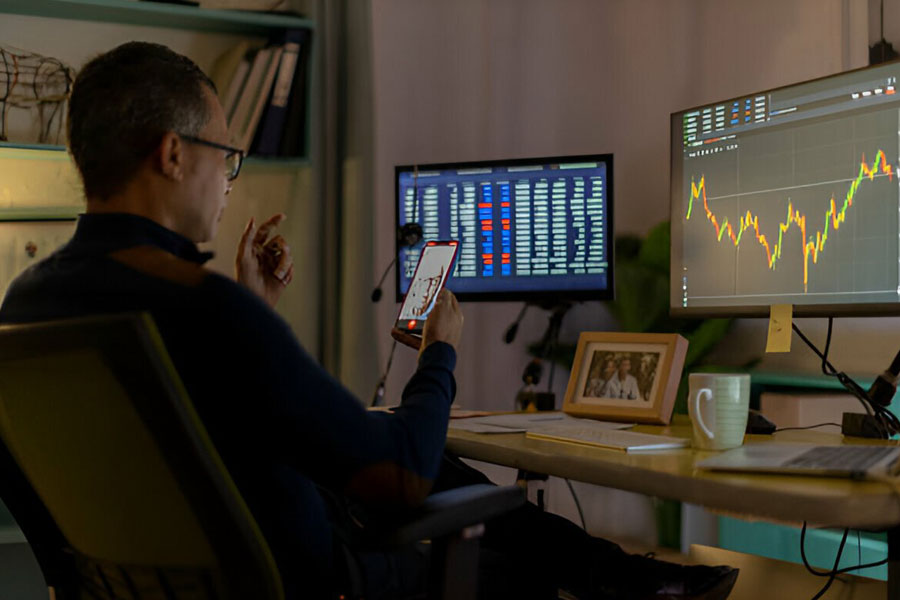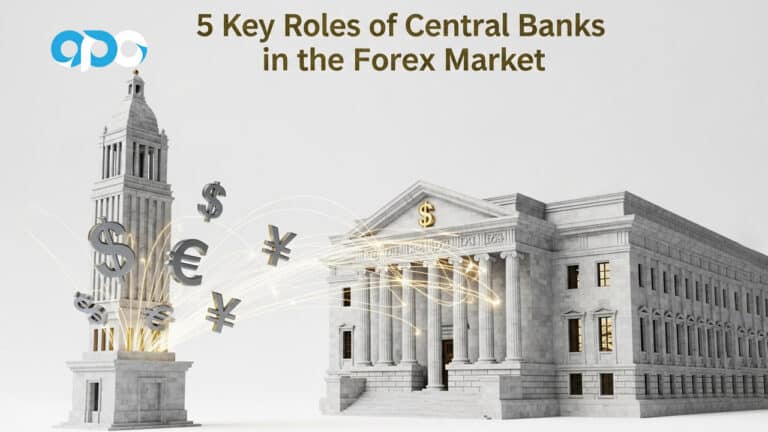Forex trading, the practice of buying and selling currencies in the foreign exchange market, is a popular financial activity with participants worldwide. However, for Muslims, the question arises: is forex trading haram or halal in Islam? This question involves a detailed examination of the principles of Islamic finance and the nature of forex trading itself. In this article, we will explore various aspects of forex trading, including leverage, swaps, commissions, and spreads, and how they align with Islamic teachings. We will also look at the differing opinions of Shia and Sunni scholars on this matter and introduce the concept of Islamic accounts provided by a broker for forex trading tailored to meet Sharia compliance.

How Forex Trading Works
Forex, or foreign exchange, trading involves the simultaneous buying of one currency and selling of another. Traders aim to profit from the changes in currency value pairs, such as EUR/USD or GBP/JPY. The forex market operates 24 hours a day, five days a week, and is one of the most liquid markets globally. It is a decentralized market, meaning that there is no central exchange, and trading is conducted over-the-counter (OTC) through a network of banks, brokers, and financial institutions.

Basics of Forex Trading
Forex trading involves various components and terminologies that are crucial for understanding how the market operates. Here are some of the key elements:

Currency Pairs
In forex trading, currencies are quoted in pairs. The first currency in the pair is the base currency, and the second is the quote currency. For example, in the EUR/USD pair, EUR is the base currency, and USD is the quote currency. The price of the pair indicates how much of the quote currency is needed to purchase one unit of the base currency.
Bid and Ask Prices
The bid price is the price at which a trader can sell the base currency, and the ask price is the price at which a trader can buy the base currency. The difference between the bid and ask prices is known as the spread.
Pip
A pip, short for “percentage in point,” is the smallest price move that a currency pair can make. It is typically the fourth decimal place in most currency pairs. For example, if the EUR/USD pair moves from 1.1050 to 1.1051, it has moved one pip.
Lot Size
The lot size refers to the amount of the base currency being traded. In forex trading, standard lot sizes include micro (1,000 units), mini (10,000 units), and standard (100,000 units).
Leverage
Leverage in forex trading allows traders to control a large position with a relatively small amount of capital. For example, with a leverage ratio of 100:1, a trader can control $100,000 with just $1,000. Leverage is a double-edged sword as it can amplify both profits and losses. It enables traders to take larger positions than their capital would normally allow, increasing the potential for significant gains. However, it also increases the risk of substantial losses.
Swap
A swap, or rollover fee, is the interest paid or received for holding a position overnight. This fee results from the difference in interest rates between the two currencies involved in a trade. For example, if a trader holds a long position in a currency with a higher interest rate compared to the currency being sold, they may earn a positive swap. Conversely, if the interest rate of the sold currency is higher, the trader may incur a negative swap.
Commission and Spread
The spread is the difference between the bid (buy) and ask (sell) prices of a currency pair, which is essentially the broker’s fee. Some brokers also charge a commission per trade, either instead of or in addition to the spread. The spread and commission are the primary costs of trading forex and can vary depending on the broker and the liquidity of the currency pair.
Read more: Is Forex Trading Legal ?
Halal and Haram in Forex Trading
In Islam, financial transactions must adhere to specific principles to be considered halal (permissible). The primary principles include the prohibition of riba (interest), gharar (excessive uncertainty), and maysir (gambling). Let’s examine how these principles apply to various aspects of forex trading.

Leverage: Halal or Haram?
The concept of leverage is contentious in Islamic finance. Leverage can be viewed as borrowing money to trade, which involves interest (riba), explicitly prohibited in Islam. When traders use leverage provided by brokers, they are essentially borrowing funds to increase their trading position. If this borrowed amount incurs interest, it is considered haram.
However, some argue that if the leverage is provided interest-free or through profit-sharing agreements, it could be considered halal. For instance, some brokers offer “Islamic leverage,” where the leverage is structured in a way that does not involve interest. Instead, the broker may charge a higher commission or spread to compensate for the lack of interest. This is a grey area with varying opinions among scholars. Traders must carefully examine the terms and conditions of the leverage provided to ensure it aligns with Islamic principles.
Swap: Halal or Haram?
Swaps or rollover fees involve paying or receiving interest, which is unequivocally haram in Islam. As a result, many Muslims avoid traditional forex accounts. When a position is held overnight, the difference in interest rates between the two currencies results in a swap fee. This fee can be positive or negative, depending on the interest rate differential.
To address this issue, some brokers offer swap-free or Islamic accounts that do not charge or pay interest, making them compliant with Islamic principles. In a swap-free account, traders can hold positions overnight without incurring or earning interest. Instead, brokers may charge a fixed fee or a higher spread to compensate for the absence of swaps. This ensures that the trading activity remains halal and does not involve riba.
Commission and Spread: Halal or Haram?
Commissions and spreads are generally considered permissible (halal) in Islamic finance, provided they are transparent and fair. These fees are seen as service charges rather than interest payments, thus not violating Sharia law. Brokers charge commissions and spreads as compensation for providing trading services and facilitating transactions.
It is essential for traders to choose brokers with transparent fee structures to ensure they are not inadvertently engaging in haram activities. A clear understanding of the costs involved in trading is crucial for maintaining compliance with Islamic principles. Additionally, traders should avoid brokers with hidden fees or practices that may be considered exploitative or unfair.
Opinions of Shia and Sunni Authorities on Forex Trading
Islamic scholars from different schools of thought have varying opinions on the permissibility of forex trading. The two major branches of Islam, Sunni and Shia, have distinct perspectives on financial transactions and their alignment with Islamic principles.
Sunni Perspective
Sunni scholars’ opinions on forex trading vary. Some scholars argue that forex trading is permissible if it avoids elements of riba (interest) and gharar (excessive uncertainty). They emphasize the importance of using Islamic accounts that do not charge or pay interest. The use of leverage is also debated, with some scholars accepting it if structured without interest.
Prominent Sunni Scholars and Institutions
- Dar al-Ifta al-Misriyyah (Egyptian Fatwa House): This institution has issued fatwas (Islamic legal rulings) stating that forex trading can be permissible if conducted through Islamic accounts that avoid riba and gharar. They stress the need for transparency and fairness in trading practices.
- Sheikh Yusuf al-Qaradawi: A prominent Sunni scholar, Sheikh al-Qaradawi has highlighted the importance of adhering to Islamic principles in financial transactions. He has mentioned that while forex trading can be permissible, traders must ensure that their activities do not involve interest or excessive speculation.
- International Islamic Fiqh Academy: This organization has discussed the permissibility of forex trading in various conferences and publications. They emphasize the need for traders to avoid riba and gharar and to use Islamic accounts that comply with Sharia law.
Shia Perspective
Shia scholars tend to be more conservative regarding forex trading. They often stress the importance of avoiding any form of interest and excessive speculation. Shia scholars generally advocate for more stringent adherence to Islamic financial principles, urging traders to use swap-free accounts and avoid conventional leverage.
Prominent Shia Scholars and Institutions
- Ayatollah Ali al-Sistani: A leading Shia authority, Ayatollah al-Sistani has issued fatwas on various financial matters, including forex trading. He advises caution and emphasizes the need to avoid riba and gharar. He recommends using swap-free accounts and engaging in ethical trading practices.
- Imam Khomeini Institute for Education and Research: This institution provides guidance on various aspects of Islamic finance, including forex trading. They stress the importance of transparency and fairness in financial transactions and advise against practices that involve interest or excessive uncertainty.
- Ayatollah Mohammad Taqi al-Modarresi: Another prominent Shia scholar, Ayatollah al-Modarresi, has discussed the ethical considerations of forex trading. He emphasizes the need for traders to avoid interest and speculative practices that can lead to significant financial losses.
- Seyyed Ali Khamenei: the Supreme Leader of Iran, views forex trading as permissible (halal) if it adheres to Islamic financial principles, primarily avoiding riba (usury) and gharar (excessive uncertainty). He advocates for the use of swap-free accounts to avoid interest, emphasizes minimizing speculative activities by basing trades on real market data, and insists on transparency and ethical conduct in all transactions. Khamenei also underscores the importance of education in understanding both the forex markets and Islamic finance principles to ensure informed and compliant trading practices.
Introduction of Islamic Accounts
To cater to Muslim traders, many brokers offer Islamic accounts designed to comply with Sharia law. These accounts typically have the following features:
- No Interest: No swap or rollover fees, thus avoiding riba.
- Transparent Fees: Clear and upfront commissions and spreads, ensuring no hidden charges.
- Fair Leverage: Some brokers offer leverage structures compliant with Islamic principles, avoiding interest-based borrowing.
Islamic accounts enable Muslim traders to participate in the forex market while adhering to their religious beliefs. These accounts are specifically tailored to meet the needs of Muslim traders, ensuring that their trading activities remain halal and compliant with Sharia law.

Features of Islamic Forex Accounts
- Swap-Free Trading: One of the primary features of Islamic forex accounts is the absence of swap or rollover fees. This ensures that traders do not engage in transactions involving interest, which is prohibited in Islam.
- Transparent Fee Structure: Islamic accounts typically have clear and upfront fees, such as commissions and spreads. This transparency ensures that traders are aware of the costs involved in trading and can make informed decisions.
- Ethical Leverage: Some brokers offer leverage structures that comply with Islamic principles. This may involve providing interest-free leverage or using profit-sharing agreements instead of traditional interest-based borrowing.
- Fair Trading Practices: Islamic accounts often emphasize ethical trading practices, avoiding excessive speculation and ensuring that transactions are conducted fairly and transparently.
Benefits of Islamic Forex Accounts
- Compliance with Sharia Law: The primary benefit of Islamic forex accounts is that they comply with Sharia law, allowing Muslim traders to engage in forex trading without violating their religious principles.
- Avoidance of Riba: By eliminating swap or rollover fees, Islamic accounts ensure that traders do not engage in transactions involving interest (riba), which is strictly prohibited in Islam.
- Ethical Trading Environment: Islamic accounts promote ethical trading practices, ensuring that transactions are conducted fairly and transparently. This aligns with the Islamic principles of justice and fairness in financial transactions.
- Flexibility and Accessibility: Islamic forex accounts provide Muslim traders with the flexibility to participate in the forex market while adhering to their religious beliefs. This accessibility allows Muslim traders to benefit from the opportunities available in the forex market.
Case Study: A Practical Example of Islamic Forex Trading
Consider Ahmad, a devout Muslim who wishes to trade forex. He is concerned about riba and gharar, so he opts for an Islamic forex account with a reputable broker. Ahmad carefully selects a broker that offers swap-free trading and transparent fees.
Ahmad starts with an initial deposit of $10,000. Using an Islamic account, he avoids any interest charges on overnight positions. Instead, his broker charges a flat commission per trade, which is clearly outlined beforehand. Ahmad trades the EUR/USD pair, aiming to capitalize on short-term market movements.
During his trading journey, Ahmad ensures he does not engage in highly speculative or excessively risky trades, aligning with the Islamic prohibition against gharar. He maintains a disciplined approach, focusing on fundamental and technical analysis to make informed trading decisions.
By using an Islamic account and adhering to ethical trading practices, Ahmad successfully navigates the forex market while staying true to his religious principles.
Read More: Tax Implications of Forex Trading
Challenges Faced by Ahmad
Despite the benefits of using an Islamic forex account, Ahmad faces several challenges in his trading journey:
- Market Volatility: Forex markets are known for their volatility, and Ahmad must carefully manage his risk to avoid significant losses. He uses stop-loss orders and limits his leverage to minimize the impact of adverse market movements.
- Finding a Reliable Broker: Ahmad spends considerable time researching and selecting a broker that offers swap-free accounts and transparent fee structures. He reads reviews, compares brokers, and ensures that the chosen broker has a good reputation for ethical trading practices.
- Continuous Learning: Ahmad understands that forex trading requires continuous learning and improvement. He invests time in educating himself about market analysis, trading strategies, and risk management techniques. He attends webinars, reads books, and participates in online trading communities to enhance his knowledge.
- Emotional Discipline: Maintaining emotional discipline is crucial for successful trading. Ahmad practices patience and avoids making impulsive decisions based on short-term market fluctuations. He sticks to his trading plan and remains focused on long-term goals.
Ahmad’s Success Story
Over the course of several months, Ahmad’s disciplined approach to forex trading begins to pay off. By adhering to his trading plan, managing his risk effectively, and continuously learning, Ahmad experiences consistent profits. Here is a detailed look at his journey and the steps he took to achieve success:
Initial Learning Phase
Ahmad starts by dedicating time to learning the fundamentals of forex trading. He enrolls in online courses, reads books, and follows market news to understand how various factors influence currency prices. He also studies Islamic finance principles to ensure his trading activities remain halal.
Developing a Trading Strategy
With a solid foundation of knowledge, Ahmad develops a trading strategy that aligns with his risk tolerance and financial goals. His strategy focuses on:
- Fundamental Analysis: Ahmad analyzes economic indicators, geopolitical events, and central bank policies to predict currency movements. He follows major economic reports such as GDP, employment data, and interest rate decisions to make informed trading decisions.
- Technical Analysis: Ahmad uses technical analysis tools such as charts, indicators, and patterns to identify potential entry and exit points. He learns to recognize trends, support and resistance levels, and price patterns to improve his trading accuracy.
- Risk Management: Ahmad emphasizes risk management in his trading strategy. He uses stop-loss orders to limit potential losses and employs proper position sizing to ensure that no single trade significantly impacts his overall portfolio. He also avoids using excessive leverage to minimize the risk of substantial losses.
Selecting a Broker and Account Setup
After thorough research, Ahmad selects a broker that offers Islamic forex accounts with transparent fees and ethical trading practices. He sets up his account, ensuring that it is swap-free to avoid any interest charges. Ahmad deposits an initial amount of $10,000 and starts trading with small position sizes to test his strategy.
Implementing the Strategy
Ahmad begins trading the EUR/USD pair, focusing on short-term market movements. He applies his fundamental and technical analysis skills to identify trading opportunities. Ahmad remains disciplined and adheres to his trading plan, avoiding impulsive decisions based on market noise.
Continuous Improvement
Throughout his trading journey, Ahmad continuously evaluates and refines his strategy. He keeps a trading journal to record his trades, analyze his performance, and identify areas for improvement. Ahmad also participates in online trading forums and communities to exchange ideas and learn from other traders’ experiences.
Overcoming Challenges
Ahmad faces several challenges along the way, but his disciplined approach helps him overcome them:
- Market Volatility: During periods of high volatility, Ahmad maintains his composure and sticks to his trading plan. He avoids overreacting to short-term price movements and focuses on long-term trends.
- Emotional Discipline: Ahmad practices mindfulness and emotional discipline to avoid making impulsive trading decisions. He takes regular breaks, stays physically active, and maintains a healthy work-life balance to manage stress effectively.
- Adapting to Market Changes: The forex market is constantly evolving, and Ahmad adapts his strategy to changing market conditions. He stays updated with the latest market developments and adjusts his trading plan accordingly.
- Balancing Faith and Trading: Ahmad ensures that his trading activities align with his religious beliefs. He regularly consults with Islamic scholars and financial advisors to verify that his trading practices remain compliant with Sharia law.
Ahmad’s Achievements
By adhering to his trading plan, practicing effective risk management, and continuously improving his skills, Ahmad achieves consistent profitability. Over time, his trading account grows, and he gains confidence in his ability to navigate the forex market.
Ahmad’s success story serves as an inspiration to other Muslim traders who wish to participate in the forex market while adhering to their religious principles. His disciplined approach, commitment to learning, and ethical trading practices demonstrate that it is possible to achieve financial success while remaining true to one’s faith.
Conclusion
The question “is forex trading haram?” does not have a straightforward answer, as it involves various factors and interpretations of Islamic finance principles. Key elements such as leverage, swaps, commissions, and spreads must be carefully examined to determine their compliance with Sharia law. Sunni and Shia scholars offer differing perspectives, but both emphasize the importance of avoiding interest (riba) and excessive uncertainty (gharar). Islamic accounts provide a solution for Muslim traders, allowing them to participate in the forex market while adhering to their religious beliefs. By understanding and applying these principles, Muslim traders can engage in forex trading in a manner that aligns with their faith.
Further Insights and Considerations
Islamic Finance and Modern Trading
Islamic finance has always emphasized ethical and moral considerations in financial transactions. As modern trading practices evolve, the challenge is to adapt these practices to comply with Sharia law. This requires continuous dialogue between scholars and financial experts to ensure that new financial products and services align with Islamic principles.
Educational Programs and Resources
To bridge the knowledge gap and promote ethical trading, educational programs and resources focusing on Islamic finance and halal trading practices are essential. Financial institutions and educational organizations can offer courses, webinars, and workshops to educate Muslim traders about compliant trading practices. By providing accessible and comprehensive resources, traders can make informed decisions that align with their religious beliefs.
Community and Support Networks
Building a community of like-minded traders can provide support and encouragement for Muslim traders navigating the complexities of forex trading. Online forums, social media groups, and local meetups can facilitate the exchange of ideas, experiences, and best practices. These networks can also serve as a platform for discussing new developments in Islamic finance and halal trading.
Technology and Innovation
Advancements in technology offer new opportunities for ensuring compliance with Islamic principles in forex trading. For instance, fintech solutions can provide automated compliance checks, ensuring that trades adhere to Sharia law. Additionally, blockchain technology can enhance transparency and trust in financial transactions, aligning with the ethical principles of Islamic finance.
Read More: Forex Market vs Other Markets
Regulatory Frameworks
Establishing robust regulatory frameworks that accommodate Islamic finance principles is crucial for the growth and acceptance of halal trading practices. Governments and financial regulatory bodies can collaborate with Islamic scholars to develop guidelines and standards that ensure financial products and services comply with Sharia law. These frameworks can provide a clear and consistent basis for evaluating and certifying halal financial activities.
Final Thoughts
Forex trading, when conducted ethically and in accordance with Islamic principles, can offer opportunities for financial growth and diversification for Muslim traders. By understanding the nuances of halal and haram in forex trading, utilizing Islamic accounts, and adhering to ethical trading practices, traders can navigate the market while staying true to their faith. Continuous education, community support, and technological innovation will play crucial roles in promoting and sustaining halal trading practices in the ever-evolving financial landscape.
As the global financial markets continue to grow and evolve, the principles of Islamic finance provide a framework for ensuring that financial activities are conducted ethically and responsibly. For Muslim traders, the availability of Islamic forex accounts and the guidance of knowledgeable scholars offer a path to engage in forex trading without compromising their religious beliefs. By remaining informed, disciplined, and ethical, Muslim traders can achieve success in the forex market while adhering to the tenets of their faith.
Additional Resources
For further reading and resources on Islamic finance and halal trading practices, consider exploring the following:
- “Introduction to Islamic Finance” by Mufti Taqi Usmani: A comprehensive guide to the principles of Islamic finance, including the prohibition of riba and gharar.
- Islamic Financial Services Board (IFSB): The IFSB provides standards and guidelines for Islamic financial institutions, promoting the stability and soundness of the Islamic financial system.
- AAOIFI (Accounting and Auditing Organization for Islamic Financial Institutions): AAOIFI issues standards on accounting, auditing, governance, ethics, and Sharia compliance for Islamic financial institutions.
- Webinars and Online Courses: Many educational platforms offer webinars and courses on Islamic finance and halal trading practices. Websites such as Coursera, Udemy, and EdX provide valuable learning opportunities for traders.
- Local Islamic Financial Institutions: Consult with local Islamic financial institutions or banks that offer Islamic accounts and services. They can provide personalized advice and guidance on compliant trading practices.
By leveraging these resources and staying informed, Muslim traders can navigate the forex market with confidence and integrity, ensuring that their financial activities remain halal and aligned with their religious beliefs.
Can Muslims trade forex without violating Sharia law?
Yes, Muslims can trade forex without violating Sharia law by using
Islamic accounts that do not involve interest (riba) and by adhering to ethical trading practices that avoid excessive speculation (gharar). It is essential to select a broker that offers swap-free accounts and has transparent fee structures to ensure compliance with Islamic principles.
Are there any specific brokers that offer Islamic forex accounts?
Yes, many brokers offer Islamic forex accounts tailored for Muslim traders. These accounts typically have no swap or rollover fees and charge transparent commissions and spreads. It’s essential to research and choose a reputable broker that aligns with Islamic principles. Some well-known brokers that offer Islamic accounts include:
XM: XM provides swap-free accounts with no rollover interest, ensuring compliance with Sharia law. They also offer a wide range of educational resources for traders.
Exness: Exness offers Islamic accounts with no interest charges and competitive spreads. They have a user-friendly platform and provide extensive customer support.
IC Markets: IC Markets provides Islamic accounts with no swap fees and transparent commissions. They are known for their low spreads and high-quality trading infrastructure.
What should Muslim traders consider when choosing a forex broker?
Muslim traders should consider the following factors when choosing a forex broker:
Islamic Account Availability: Ensure the broker offers Islamic (swap-free) accounts that comply with Sharia law.
Transparency of Fees: Look for brokers with clear and upfront fee structures, including spreads and commissions, to avoid hidden charges.
Leverage Structure: Check if the broker offers leverage options that do not involve interest (riba) and align with Islamic principles.
Reputation and Regulation: Choose brokers that are regulated by reputable financial authorities and have a good reputation for ethical trading practices.
Customer Support: Select a broker with responsive customer support to address any concerns or issues promptly.
Educational Resources: Opt for brokers that provide educational materials, webinars, and training to help traders improve their skills and knowledge.








One Response
we will appreciated if you email them our support team